Dr. Amber Hill understands the value and importance of life-long learning. She earned her PhD in Biomedical Neuroscience at UCL, after earning her Masters in Clinical Neuroscience. While most people who finish a challenging PhD program are (understandably) “maxed out” on academia life for at least a few years, Dr. Hill proceeded to enroll in some continuing education computer science courses at Harvard on the side of her Postdoctoral research.
After years of experience specializing in end-to-end medical research, she realized there was an unmet need she could help fill. She soon added entrepreneur/CEO to her CV and founded Research Grid (R.grid), a start-up that intelligently streamlines clinical trial operations and engagement from months to minutes. “R.grid was formed out of frustration. The research process is inefficient and inaccessible. We started to use Artificial Intelligence (AI) to streamline the arduous administration processes that people hated anyway in clinical operations, and also patient and community engagement.”

R.grid product image
“I’m what you might call a qualification junkie.”
As R.grid began to scale, Dr. Hill began her common process of self-reflection and realized that the best way to grow her company was to continue growing her skillset. She had a powerful STEM background, but as a new CEO, sought ways to strengthen her management and leadership capabilities. She applied and was accepted to the Royal Academy of Engineering’s Shott Scale Up Accelerator - a competitive six-month program from the Academy’s Enterprise Hub that develops, nurtures and strengthens the leadership capabilities of senior decision-makers in high-growth engineering and tech SMEs with support toward the best leadership training anywhere in the world.
Dr. Hill began to research her options – looking for a program that would address the specific knowledge gaps she was aiming to fill, versus a one-size-fits-all management program. She quickly realized an Executive Certificate in Management and Leadership would allow her the flexibility to do just that.
“I completed the Management and Leadership Certificate with key courses: Artificial Intelligence: Implications for Business Strategy, Digital Marketing Analytics, Negotiation for Executives, and then lastly Communication and Persuasion in the Digital Age. The marketing and communication aspects were important because no one on my current team has that specific degree background. As someone scaling a company, meeting with investors, etc. – negotiation is another valuable must-have skillset as well as the communication and persuasion aspect of this. The AI course in business was more out of personal interest. I probably had a higher level of knowledge about the topic than my classmates given my background, but it still taught me how we might implement AI in our internal processes and not just for our customers.”
"There’s not one course I took for which I didn’t have the intention of applying the outcomes at R.grid. All of the courses were strategically selected to form the Management and Leadership Executive Certificate, specifically designed for me."
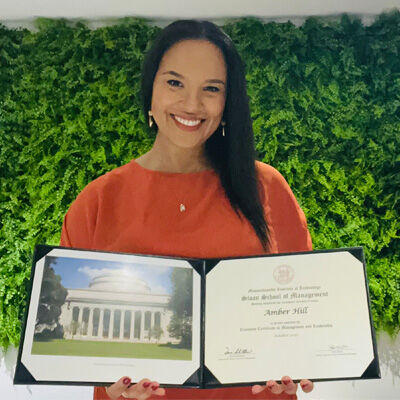
A perfect blend
Dr. Hill selected a mix of online and in-person courses. The self-paced online courses, although a longer time commitment, were flexible and proved to be a good disciplinary exercise, forcing her to set aside time to learn, slow down and absorb the information. “The assignments you do tend to be quite aligned with helping you develop a strategy to implement in your work.”
Meanwhile, the in-person courses were great for building camaraderie with classmates and engaging with different perspectives. For example, “I was able to connect with someone else in the industry who provided insights on potential business strategies and ways to expand. Most of the workload during in-person classes are group work and partner exercises. It’s a different structure to the online courses of course, but I liked having the mix of both. There was also the added perk of walking around campus and feeling the nostalgia of ‘being a student’ again.”
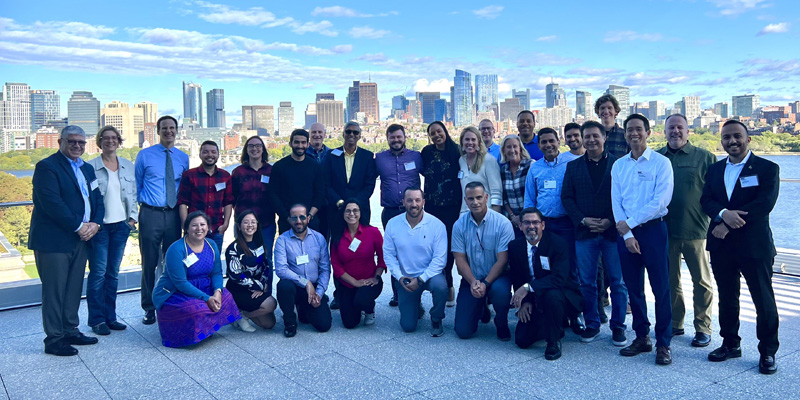
Class photo of Negotiations for Executives participants and faculty
Lessons learned
“There’s not one course I took for which I didn’t have the intention of applying the outcomes at R.grid. All of the courses were strategically selected to form the Management and Leadership Executive Certificate, specifically designed for me.”
While all the courses were valuable, her favorite was Negotiation for Executives. “I naturally loved the live data-driven perspective, because our own work at R.grid is very data-driven.” The course exposed her to a wide variety of negotiation styles and the realization that you don’t have to necessarily be a “shark” to be successful. You could create value and be more collaborative, along with claiming and legitimizing value to get the results you want.
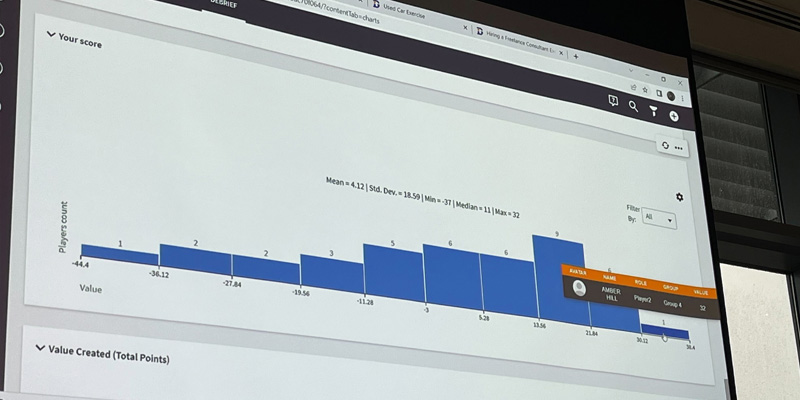
Image from one of the simulation games played during Negotiation for Executives reflecting a winning score for Dr. Hill
“I really learned about myself and my own style using the live data of my performance results in the class. I immediately started using some of the outputs too. We’ve used ‘Seven Elements for Negotiation’ religiously since taking the course in our preparation for contracts and sales discussions, for example. It helps us determine where we want to find balance and give clients as much as we can to feel valued, but also be strict about the value we add. It’s been great – even the number of sales we’ve made since then has increased dramatically!”
Communication and Persuasion in the Digital Age was another course with an unexpected impact. It’s easy to promote a business one’s passionate about. Self-promotion, on the other hand, can sometimes feel a bit awkward. Dr. Hill is a self-described introvert, as she regains her energy by being alone, so a lot of the social aspects that come with being the successful entrepreneur and growing company can quickly drain her energy. As a result, maintaining a personal social media presence has been low on her list of (many) competing priorities. “This course challenged me on that. They pointed out that because we’re an early-stage company, people first learn to trust the brand via its founder and leadership. So, it’s important to be more active in posting content to position myself as a knowledge leader.”
She realized that it was important to push herself on things she personally didn’t find enjoyable, interesting, or naturally easy because in the end, it could be good for the company. A somewhat dormant Twitter or LinkedIn account may not have previously seemed like a big deal as she has thousands of followers on each without posting, but now Dr. Hill has reconsidered her stance on the matter. “It really broadened my perspective of why I should do that and if we don’t, how it would impact the company in the long term.”
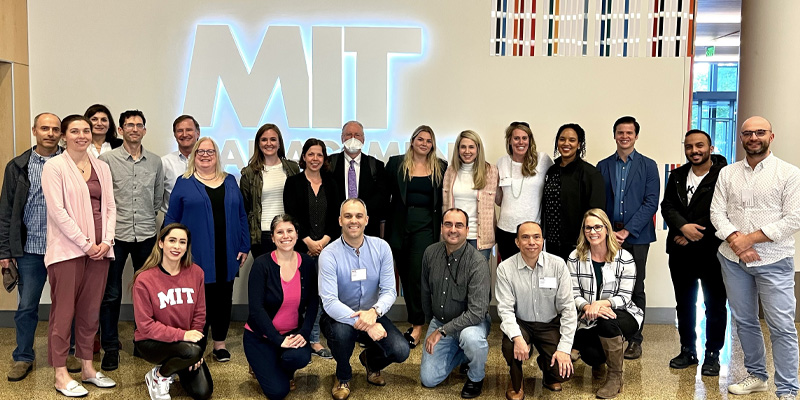
Class photo of Communication and Persuasion in a Digital Age participants and faculty
Sharing the wealth (of knowledge)
Of course, the learning doesn’t stop at the top. Like any successful leader, Dr. Hill understands the importance of sharing knowledge and not hoarding expertise. After earning her certificate, she realized how Executive Education courses could be valuable for others on her team. “My CTO will be doing Managing Technical Professionals and Organizations later this fall and our COO will be taking some courses too. My Business Development Manager will also take Negotiation for Executives down the road. It’s important to pass on knowledge – it builds their resumes and helps the company overall. It all trickles down, for sure!”
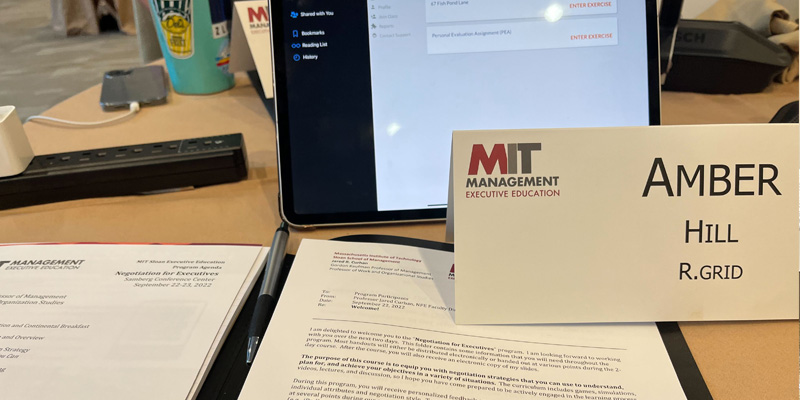
New horizons
By now, you can probably guess that Dr. Hill’s learning won’t stop with the completion of the Executive Certificate in Management and Leadership.
“There are so many courses I still want to take! I’m really intrigued by Pricing: Using Data to Improve Pricing Performance – I actually have a whole list of classes already in mind I would love to do. My main limit is time. I didn’t get to take every course I was interested in obviously, but I still got what I needed from the courses available and within a very short time frame.” Dr. Hill managed to earn her Executive Certificate in less than two months, despite those months being some of her most hectic - she was traveling constantly between California, New York, and London meeting with investors and big pharma. “Live online courses are probably the next best thing since I won’t have to travel or commit more than a couple days to a lesson plan.”
Her next goal is an Executive Certificate in Strategy and Innovation – a topic she’s already passionate about. She was initially tempted to pursue this Executive Certificate first, but realized the immediate need lay with management and leadership development for growth and scale of the Company. It is important for her to stretch herself beyond her areas of expertise and she says will continue to do so. “I will always push myself out of my comfort zone and it’s necessary for the scalability and growth of my company.”
Learn more about earning an Executive Certificate.
Contributed by Elaine Santoyo Goldman








